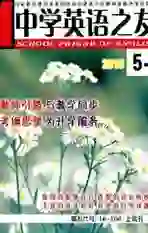七年级(下)重点词语归纳
2010-07-14王小英
王小英
1. open与close
1) close v. “关闭,结束”。如:
Please close the door. 请关门。
2) close adj. 靠近的,亲近的。如:
The church is close to the school. 教堂在学校附近。
3) closed adj. “关闭的”。如:
The door is closed. 门关着。
4) open v. “开,打开”,与close意义相反。如:
Please open the door. 请开门。
The door opened slowly. 这扇门慢慢地打开了。
5) open adj. “开着的”。如:
The door is open. 门开着。
【小试牛刀】Dont ____ the door. Please keep it ____.
A. close; open B. closed; opened C. closed; open D. close; opened
2. enjoy
enjoy常用作及物动词,意思是“喜欢”、“乐于”、“享受……的乐趣”。现将其用法简述如下:
1) enjoy后接名词或代词。如:
They are enjoying their dinner. 他们在津津有味地吃饭。
Do you enjoy the film? 你喜欢那部电影吗?
Alice doesnt enjoy it. 爱丽斯不喜欢它。
2) enjoy后面可接动词-ing形式。如:
I enjoy listening to light music. 我喜欢听轻音乐。
Do you enjoy reading? 你喜欢读书吗?
He doesnt enjoy singing. 他不喜欢唱歌。
Many students enjoy asking questions in English. 许多学生喜欢用英语问问题。
3) enjoy后面可接反身代词(oneself),构成固定搭配enjoy oneself,意为“过得愉快、玩得高兴”,相当于have a good time。如:
——Did you enjoy yourself at the party? 你在聚会时玩得高兴吗?
——I enjoyed myself very much at the party. 我在聚会时玩得很开心。
【小试牛刀】Do you enjoy ____ pop music?
A. listening to B. listening C. listen to D. to listen
3. hope
1) 用于表示可能实现的事情,后接从句时,用陈述语气。如:
I hope I shall see him again. 我希望再见他一次。
I hope you havent hurt yourself. 但愿你没有受伤。
2) 用于指对好事的盼望、预想;对坏事的预想则多用“Im afraid…”。如:
I hope it will be fine tomorrow. 我希望明天天气好。
Im afraid it will rain again. 恐怕还要下雨。
3) hope 所希望的一般指将来或现在的事情,不用于指过去的事情。如:
I hope he will come. 我希望他会来。
4) 可用hope to do sth.句型,而不能用hope sb. to do sth.句型。如:
I hope to watch the football match again. 我希望再看一次那场足球赛。
5) hope后面还可以接that 从句,意为“希望……;能……就好了”。如:
She hopes that I will pass the exam. 她希望我能通过考试。
【词组搭配】
1) in the hope of sth. 怀着……的希望
2) live in hope(s) of 满怀希望
3) hope for the best 希望获得最好的结果
【小试牛刀】We hope ____ the book again very much.
A. us to read B. to read C. us reading D. reading
4. the other, another, other与others
1) the other指两者中的“另一个”,通常与 one搭配使用,构成one…the other(一个……另一个)。如:
Miss Gao has a book in one hand, and a pen in the other.
高老师一只手拿着一本书,另一只手拿着一枝钢笔。
The little girl slowly closed one eye and then the other.
小女孩慢慢地闭上了一只眼睛,然后又闭上了另一只。
2) another可以被看作是an与other两个词的融合,作“另一个”,“不同的”解,其后只能跟单数名词,指不确定数目中的“另一个”。如:
I dont like this one, show me another. 我不喜欢这个,给我看看另一个。
They stood up one after another. 他们相继站起来。
但是,当another作“再”,“另外的”解时,可修饰复数名词,这时它后面大都跟有few或基数词。如:
Theres room for another few people in the back of the bus.
在这辆公共汽车的后部还能容纳一些人。
The farm already has ten cows, but they are buying another five (cows).
这家农场已有10头奶牛,但计划要再买5头。
3) other表示“别的”,“另外的”,只能与复数名词连用。others=other+可数名词复数。如:
There are other ways of doing this exercise. 做这个练习还有别的方法。
Ask some other people. 问别人吧。
Some students like English and others (other students) like physics.
有些学生喜欢英语,有些学生喜欢物理。
【中考回放】
——We have five kinds of schoolbags. Do you like this one?
——No. Can you show me ____?(09年广东省)
A. another B. each other C. the other D. others
5. stop, remember, forget后接doing和to do
1)stop doing sth.与stop to do sth.
stop doing sth.是“停止做某事”,doing是stop 的宾语,是要停止的动作;stop to do sth.是“停下来开始做某事”,to do是stop的状语,表示目的,是要开始做的事情。如:
The two girls stopped talking when they saw me. 那两个女孩一见到我就停止了讲话。
The two girls stopped to talk to me when they saw me.
这两个女孩一看到我就停下来和我讲话。
2)forget/remember to do sth.与forget/remember doing sth.
①forget/remember to do sth. 意为“忘记/记得要做某事”,这里的不定式所表示的动作还没有发生。如:
I forgot to lock the door. 我忘记锁门了。(门没有锁)
I remembered to do my English homework. 我记得要做英语作业。(还没有去做英语作业)
②forget/remember doing sth. 意为“忘记/记得曾经做过某事”,表示曾经做了,而忘记/记住了,这里的动名词所表示的动作已经发生过了。如:
I forgot locking the door. 我忘记锁过门了。(意思是门锁过而忘记了)
We remembered writing a letter to you. 我们记得曾给你写过一封信。(意思是写过信并且记住了)
【中考回放】
——Dont forget ____ my parents when you are in Beijing.
——OK!I wont. (09年长沙市)
A. to see B. see C. seeing
6. visit
1) v. 访问,拜访,探望,参观,游览,采访。 如:
Our headteacher visited America. 我们的班主任访问过美国。
We often visit our grandma. 我们经常探望奶奶。
2) n. 访问,往来,参观,游览。如:
The visit to an island is very interesting. 这一次岛屿游览非常有趣。
3) visitor n. 访问者,来宾,游客,参观者。 如:
He is an English visitor. 他是一名英国游客。
【小试牛刀】“What are they doing?”“They ____ the Great Wall.”
A. are visiting B. visiting C. is visiting D. visit
7. take与bring
bring 和take都含有“拿、带”的意思,但在使用时却有所不同。
1) bring意为“拿来、带来”,指把某物或某人从别处带到说话人所在的地方。如:
Bring me a cup of tea, please. 请给我拿杯茶。
Please bring the CD to school tomorrow. 请明天把那张CD带到学校。
2) take意为“拿走、带到”,指把某物或某人从说话人所在的地方带到别处。有away的含义。如:
Could you help me to take the box to the classroom? 你能帮我将这个盒子拿到教室吗?
Ill take you to see our teacher. 我将带你去见我们老师。
注意:bring与here连用,不与there连用;take与there连用,而不与here连用。bring/take sb. sth.=bring/take sth. to sb.。如:
Bring me a dictionary.=Bring a dictionary to me.
Take him this story book.=Take this story book to him.
【中考回放】
——Its raining, Daisy. Please ____ an umbrella with you.
——Thanks. Ill return it to you when I ____ next week. (09年深圳市)
A. take; come B. take; will come C. bring; come D. bring; will come
8. also, too与either
两者都是副词,also用法比较正式, 在口语中不常用,一般只用于肯定句,有强调的意味,常位于主谓之间,即实义动词之前,助动词之后;too一般只用于肯定句,通常置于句末,也可插到句中间,有时也可用于否定的陈述句中,但不能放在否定词的后面;either用于否定句句尾。例如:
They also like playing volleyball. 他们也喜欢打排球。
He is also a student. 他也是一个学生。
I can also do it. 我也能干。
Im fine, too. 我也很好。
He likes comedies, too. 他也喜欢喜剧。
He isnt in Class 3, either. 他也不在3班。
【中考回放】
——I am not sure which tie to wear for the party.
——God!I have no idea, ____.(09年泰安市)
A. too B. neither C. either D. also
9. wear; dress; put on与(be) in
这几个词都和“穿;戴”有关,但用法不同。
1) wear是“穿着;戴着”的意思。强调状态。如:
Lucy always wears a red coat. 露西总是穿一件红色大衣。
2) dress作及物动词,后接反身代词,表示“某人自己穿衣服”;后接sb.,表示“给某人穿衣服”。dress up意为“盛装;装扮”。如:
The boy can dress himself. 这个男孩能够自己穿衣服了。
3) put on指“戴上;穿上”,强调动作。如:
He put on his hat and left. 他戴上帽子离开了。
4) “(be) in+颜色”表示穿什么颜色的衣服,强调状态。如:
The girl in red is my sister. 穿红衣服的女孩是我妹妹。
【中考回放】
——I saw Ann ____ a green dress at the school meeting.
——I think she looks better ____ red. (09年烟台市)
A. dressed; in B. put on; wear C. wearing; in D. wear; put on
10. sound
1) n. 声音。如:
I heard strange sounds in the distance. 我听见远处有怪声音。
2) v. 听起来(连系动词,后跟形容词作表语)。如:
That sounds interesting. 那听起来很有趣。
【拓展延伸】sound, look, smell, taste, feel意思分别为“听起来、看起来、闻起来、尝起来、觉得或摸起来”。这五个动词均为连系动词,后面接形容词作表语。如:
The flower smells very sweet. 这花闻起来很香。
The cotton feels very soft. 这棉花摸起来很软。
【中考回放】
——Hi, Tony. The milk shake ____ good!
——Im glad you like it. (09年济南市)
A. sounds B. falls C. goes D. tastes
——Long time no see!
——Oh, it ____ like years since I last saw you. (09年安徽省)
A. looks B. seems C. feels D. sounds
